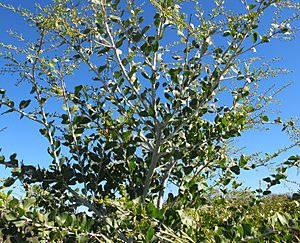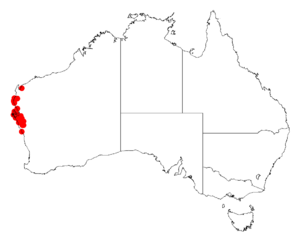Acacia chartacea facts for kids
Quick facts for kids Acacia chartacea |
|
|---|---|
 |
|
| Acacia chartacea in bud | |
| Scientific classification | |
| Genus: |
Acacia
|
| Species: |
chartacea
|
 |
|
| Occurrence data from AVH | |
Acacia chartacea is a special kind of shrub or small tree. It belongs to a large group of plants called Acacia, also known as wattles. This plant only grows in a specific area along the west coast of Western Australia. When a plant or animal only lives in one place, it's called endemic.
Contents
What Does Acacia chartacea Look Like?
This plant usually grows as an upright, sometimes messy, shrub or tree. It can reach a height of about 1.5 to 4 meters (5 to 13 feet). Sometimes, it can even grow as tall as 6 meters (20 feet).
Branches and Leaves
The plant's small branches might have tough, sharp parts called stipules. These are like tiny leaf-like structures, about 3 to 6 millimeters long. However, older plants often don't have them.
The leaves of Acacia chartacea are quite unique. They are not like typical flat leaves. Instead, they are flattened leaf stalks called phyllodes. These phyllodes are green and not perfectly even on both sides (asymmetric). They have an oval or elliptical shape. Each phyllode is about 2 to 6.5 centimeters (0.8 to 2.6 inches) long and 1 to 3.3 millimeters (0.04 to 0.13 inches) wide. You can see a clear line, called a midrib, running down the middle of each phyllode.
Flowers and Seed Pods
Acacia chartacea blooms from August to December. During this time, it produces pretty cream-yellow flowers. The flowers grow in clusters called inflorescences. These clusters are found in the upper parts of the plant, near where the leaves join the stem. Each cluster is shaped like a ball and is packed with 60 to 90 cream to pale yellow flowers.
After the flowers bloom, light brown, narrow, oblong-shaped seed pods form. These pods can grow up to 5 centimeters (2 inches) long and are about 8 to 12 millimeters (0.3 to 0.5 inches) wide.
How Was Acacia chartacea Named?
A botanist, who is a scientist who studies plants, named Bruce Maslin first officially described this species in 1992. He wrote about it in a scientific journal called Nuytsia.
Later, in 2003, another botanist named Leslie Pedley changed its name to Racosperma chartaceum. However, in 2006, it was moved back to the Acacia group, which is its current scientific name.
Where Does Acacia chartacea Grow?
This plant is native to a specific part of Western Australia. It grows along the west coast, in areas known as the Mid West and the Gascoyne regions. You can find it from Northampton in the south all the way up to Canarvon in the north.
Acacia chartacea likes to grow on and among sand dunes and sandy plains. It prefers sandy soils or sandy-clay soils. Often, you'll find this shrub growing as part of thick shrubland communities. At a place called Cape Cuvier, it grows among Triodia plants in soils that are alkaline (meaning they have a high pH).

